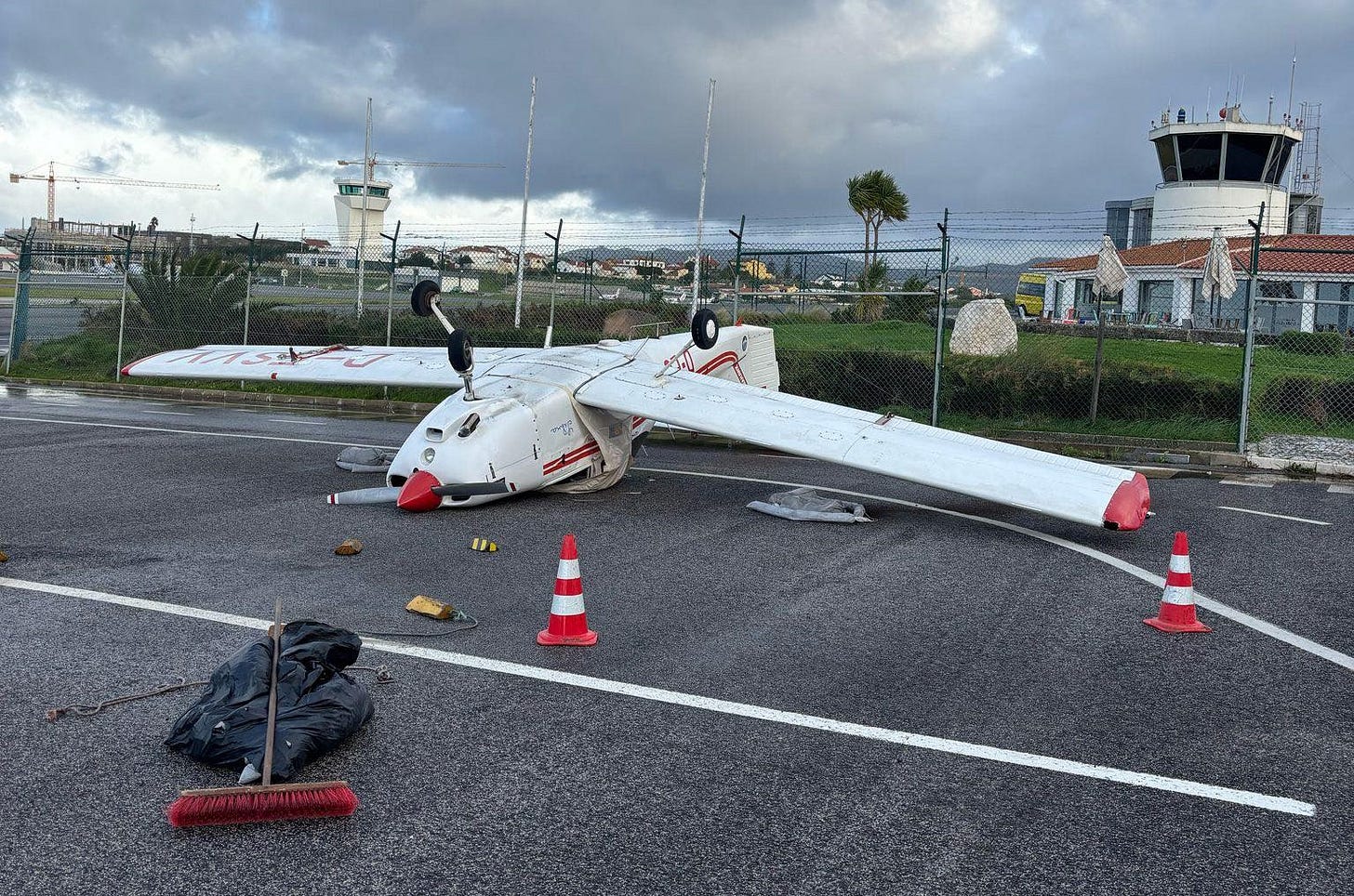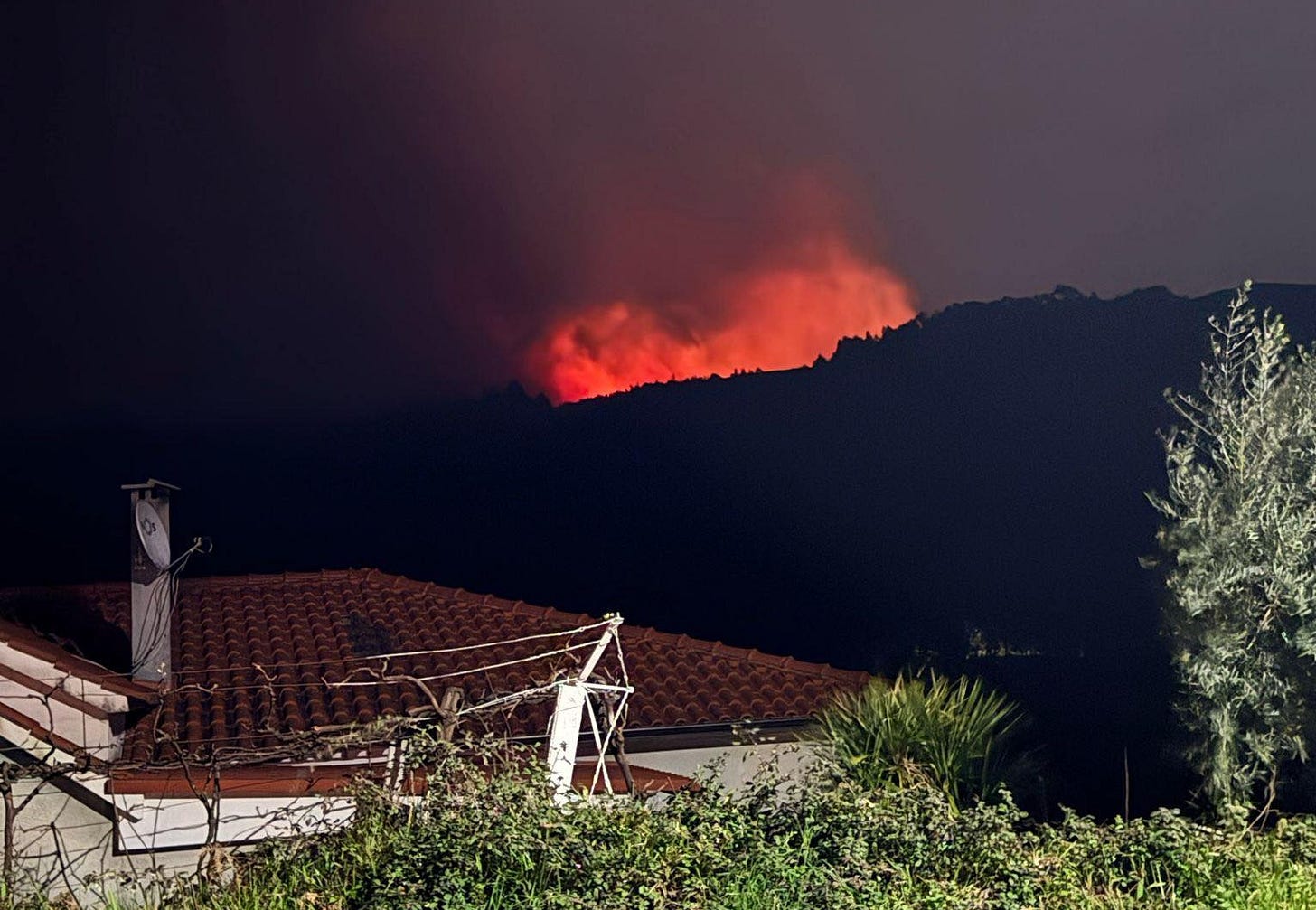Friday Briefing: Hold on, the sun is coming
Good morning and welcome to PORTUGAL DECODED. Storm Martinho is the fourth major storm to hit Portugal this winter. Is this weather pattern normal and, most importantly, when will it change?
TALK OF THE TOWN

This week, we want to take a moment to express our deepest gratitude to the incredible firefighters and officers who put their lives on the line to protect our communities. Whether battling wildfires, or providing aid during powerful storms, these heroes work tirelessly to keep us safe. Thank you.
POLITICS
The first poll conducted after the Government’s collapse shows a sharp rise in undecided voters. Standing at 39%, they now outnumber the combined support for the ruling Democratic Alliance (20%) and the Socialist Party (15%) (More).
Madeira votes Sunday amid political turmoil and corruption allegations against the incumbent Social Democrats (PSD). Polls suggest that the PSD may regain an absolute majority, continuing their near 50-year rule in the region (More).
SOCIETY
Foreign residents can now obtain tax, social security, and health ID numbers in a single step, simplifying bureaucracy and reducing strain on public services. The service is available both online and at select in-person locations (More).
Lisbon has emerged as one of the top 10 European cities with the highest levels of ecstasy consumption on weekends, according to a new study analysing wastewater. Meanwhile, cocaine consumption appears to be declining (More).
ECONOMICS
Porto Business School’s online MBA has secured the eighth place in the Financial Times global 2025 ranking, with alumni reporting an average annual salary of around €145,000 three years after completing the program. (More).
House prices in Portugal rose at their fastest pace in over a year (up 13.6% year-on-year in February), driven by increased demand, slow construction rates, and falling mortgage interest rates, with prices expected to keep climbing (More).
CULTURE AND SPORTS
For the first time in 65 years, the iconic Asterix and Obelix will embark on an adventure in ancient Lusitania, the territory that is now Portugal. The new book, Asterix in Lusitania, will be released in Portugal on October 23 (More).
Portugal’s largest British art collections, Gulbenkian and Berardo, have united for a major exhibition in Lisbon, showcasing over 100 works from international and Portuguese artists with UK ties, running from March 15 to July 21 (More).
If enjoy reading PORTUGAL DECODED, please consider donating to keep it free and independent – your generosity means everything!
DECODER
What’s the Martinho depression and how severe was its impact?
The Martinho depression is a powerful storm system affecting Portugal from Wednesday (the first day of Spring!) to Saturday, bringing heavy rain, strong winds (gusts over 160 km/h, or 99.42 miles/h), and flooding. By Thursday morning, the National Authority for Emergency and Civil Protection (ANEPC) reported over 6,000 incidents, including fallen trees, structural damage, and power outages. The hardest-hit areas were Greater Lisbon (35% of incidents) and Setúbal (10%). The storm left 80,000 people without electricity, injured six in Lisbon, and forced the evacuation of at least 15 individuals. Severe transport disruptions included road closures, speed limits on Lisbon’s bridges, and railway suspensions due to fallen trees and debris. Maritime conditions were also dangerous, leading to the closure of 18 coastal bars.
Just how rare are these weather events in Portugal?
These events are somewhat rare. Although March is only halfway through, rainfall has already exceeded the 1991-2020 average. Mainland Portugal has recorded 114 mm of rain so far, still below the record highs of 273.8 mm in 2000 and 272.1 mm in 2018. Reaching the 2000 record would require an additional 159.8 mm in the next 14 days -unlikely, but not impossible given the intensity of Storm Martinho. At the same time, this March has already set a record for the number of depressions. Portugal and the Iberian Peninsula have been affected by four major storms—Jana, Konrad, Laurence, and Martinho—the highest for any March. The Portuguese Institute of the Sea and Atmosphere (IPMA) notes that while unusual, this is not unprecedented.

What’s causing all these storms?
Blame it on the Azores High - the large, semi-permanent high-pressure system located in the North Atlantic Ocean, near the Azores archipelago, that plays a crucial role in shaping weather patterns across Europe, particularly in Western Europe and the Iberian Peninsula. This winter, the Azores High is weaker and positioned further south than usual, distancing itself from the Iberian Peninsula. This shift allows North Atlantic depressions to reach Portugal more frequently. While this pattern isn’t entirely new, what makes March unusual is the rapid succession of storms. Beyond the well-understood factors behind depression formation, rising ocean surface temperatures suggest climate change may be playing a role. According to IPMA, North Atlantic sea temperatures are persistently above average - by 3 to 4°C in some areas - fueling warmer, more humid, and unstable air masses. This leads to intense rainfall, thunderstorms, and strong winds hitting Portugal.

How long will the rainy weather last?
The short answer is: until Sunday. After that, there’s some uncertainty, although most weather models predict more stable conditions - though some models still suggest the rainy pattern could extend into the first week of April, gradually decreasing over time. As April progresses, temperatures are expected to stabilize, with spring becoming more apparent. By May, significantly warmer and prolonged heat is forecasted. IPMA also notes that rising air temperatures will align with warming ocean temperatures, leading to an unstable spring with abrupt weather changes before transitioning to sustained warmth.
TIPS OF THE WEEK
Lisbon
MACAM opening
Lisbon’s new hotel-museum - the Armando Martins Museum of Contemporary Art (MACAM) - will open its doors to the public on Saturday, March 22. Showcasing works by renowned artists such as Daniel Buren, Marina Abramović, and Olafur Eliasson, the museum will celebrate its inauguration with three days of events, including music, poetry, and guided art exhibitions. Admission will be free to the public from 10:00 to 19:00 on Saturday, Sunday, and Monday. Housed in the iconic Palácio Condes da Ribeira Grande on Rua da Junqueira, the museum will debut with approximately one-third of its 600-piece collection, featuring a permanent exhibition and two temporary ones in the new contemporary wing. Among the highlights is the oldest work in the collection, “A sesta dos ceifeiros” (The Reapers' Siesta), by José Malhoa (1855-1953), displayed in the gallery’s first room. Meanwhile, the hotel will initially operate exclusively for invited guests, with plans to open to the general public at Easter.
Porto
Hamlet
Hamlet is the most written-about book, after the Bible. The Prince of Denmark’s story is the story of our own vacillation before that primeval question: “Who am I?” In this staging, Director Nuno Cardoso, who ventures for the sixth time into the dramatic world of William Shakespeare, sets out to inquire into that blindness of oneself, a pathology of modern times. It premieres on April 3 at the Teatro Nacional de São João and will run until April 27, with performances on Wednesdays, Thursdays, and Saturdays at 7:00 PM, Fridays at 9:00 PM, and Sundays at 4:00 PM. Ticket prices range from €7.50 to €16. After the opening season, the production will embark on a national tour, stopping at the Cineteatro António Pinheiro in Tavira on May 17, the Cultural Center of Paredes on May 24, the Aveirense Theatre on May 29 and 30, and the Teatro das Figuras in Faro on June 7. The show is subtitled in English.
Oliveira do Bairro
Semente Festival
From March 18 to 23, the village of Mamarrosa, in Oliveira do Bairro, will host the 4th edition of the Semente Festival, an event that brings together art, literature, nature, sustainability, and community. Organized in partnership between Promob – Association for Community Promotion and Mobilization – and the Olga Santos Gallery, the festival offers a cultural program designed for all ages. Activities include workshops, lectures, studios, music performances, film screenings, theater and poetry shows, as well as inspiring conversations on the theme of “seeing slowly.” As usual, the weekend will be highlighted by the Book and Tree Fair, the heart of the festival, bringing together booksellers, antique book dealers, and vendors of plants, trees, and seeds. This marketplace reflects the event’s spirit of sharing and, in this new edition, is expected to take place in the square next to Mamarrosa’s church.
Lagoa
Circle Wine Tastings
Mark your calendars for March 29 and join Morgado do Quintão for an unforgettable evening of wine, pizza, and cinema. The night will begin with a curated selection of wines, perfectly paired with artisanal pizza slices crafted by Arte Bianca Cucina Italiana, who have prepared a unique pizza tasting for this special evening. As the sun sets, guests will gather under the open sky for a handpicked film centered around wine: Bottle Shock (2008). Presented in partnership with Counting Stars Open-Air Cinema, this cinematic experience is a tribute to the beauty of storytelling and the magic of shared moments. The setting is informal and intimate—just bring your curiosity, love for good stories, and appetite for honest flavors. Clear skies are hoped for, but if the weather doesn’t cooperate, another night will be chosen to gather under the stars. Spaces are limited, so be sure to reserve your spot.
If enjoy reading PORTUGAL DECODED, please consider donating to keep it free and independent – your generosity means everything!









Thank you for these posts and substack; very helpful!
Just wanted to say bravo for your Substack — finally, an in-depth analysis that doesn’t read like a Google Translate version of the Portuguese news (looking at you, “other publications”). I’m a new follower and already hooked. Looking forward to reading more of your sharp, original takes!